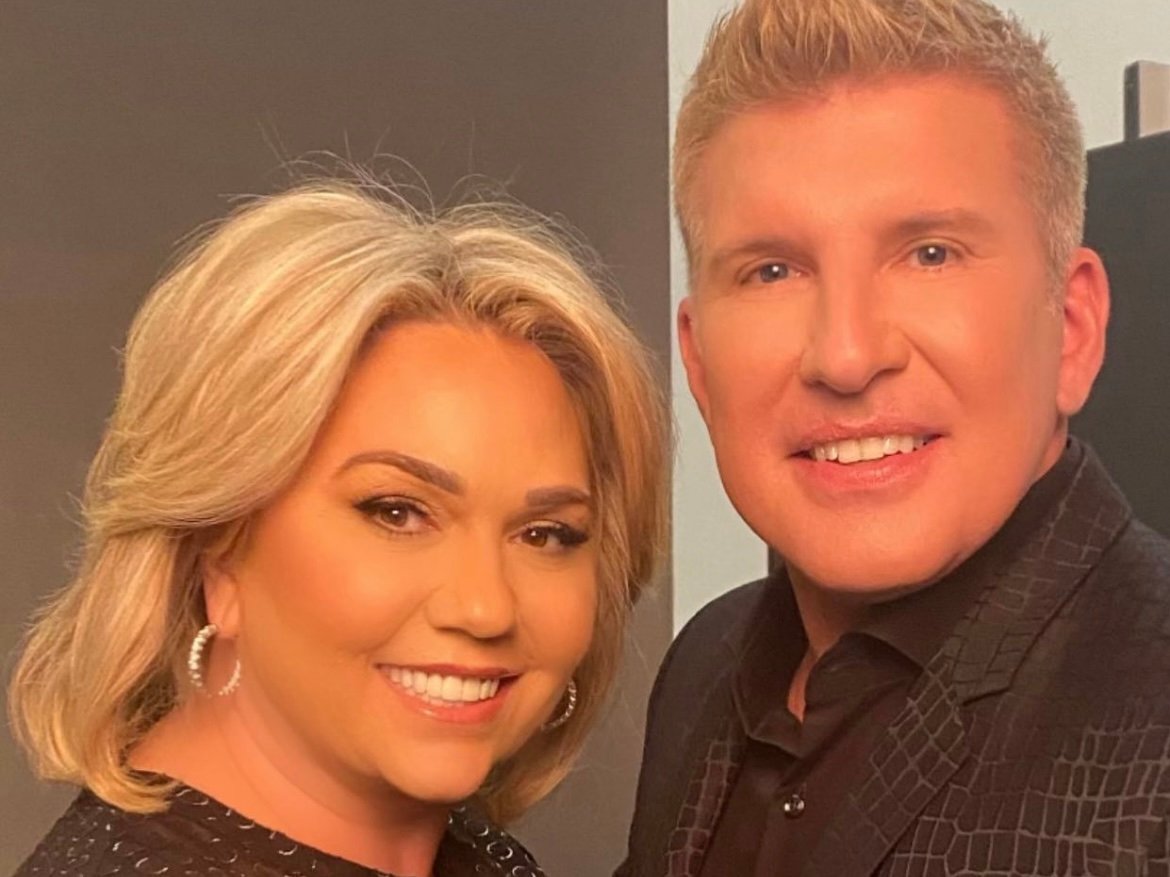ATLANTA (CN) — A panel of the Eleventh Circuit heard arguments Friday to decide whether reality television stars Julie and Todd Chrisley could be entitled to a new trial on their federal bank fraud and tax evasion convictions after they claimed prosecutors conspired with an IRS officer to misrepresent their tax debts.
Currently serving 12- and 7-year prison sentences, respectively, husband and wife Todd and Julie Chrisley claim a Georgia federal judge unfairly failed to hold a hearing on their allegation that an Internal Revenue Service officer lied on the witness stand about how much money the defendants owed the IRS at the time of their trial.
The “Chrisley Knows Best” stars and their accountant Peter Tarantino were convicted of bank fraud, tax evasion and conspiracy offenses in June 2022. Julie Chrisley was also convicted of wire fraud and obstruction of justice for submitting a falsified document to the grand jury.
The government says the couple funded their lavish lifestyle by submitting bogus documents to Atlanta community banks to secure more than $36 million in fraudulent loans. They failed to repay over $20 million in loans when Todd Chrisley declared bankruptcy.
The Chrisleys hid income from their reality show and tried to evade payment of back taxes. The couple was ordered to pay restitution and a forfeiture money judgment of $17.2 million.
An attorney for the Chrisleys argued Friday that prosecutors knew the defendants did not owe the IRS at the time of the trial but told IRS revenue officer Betty Carter to base her testimony on the agency’s Employee User Portal, which showed that the couple still owed taxes for several years.
Attorney Alex Little of Burr & Forman said prosecutors believed that if Carter were relying on the portal, a “technically correct document but one that they recognized was misleading,” her testimony would be considered true.
Assistant U.S. Attorney Annalise Peters said there is “no evidence whatsoever” suggesting that the government coached the witness to lie or that Carter intentionally gave inaccurate testimony.
The Chrisleys still owed taxes for 2010, 2011 and 2016 at the time of the agent’s testimony, Peters told the panel. The Chrisleys wrote checks to clear those debts in September 2022, four months after the trial.
U.S. District Judge Eleanor Ross sided with the government in a January 2023 order rejecting the Chrisleys’ request for a new trial. Ross also denied the Chrisleys’ motions for acquittal.
U.S. Circuit Judge Robin Rosenbaum, a Barack Obama appointee, asked Friday whether the allegations are “pure speculation” on the defendants’ part.
Little told the panel that the Chrisleys had no outstanding tax liability at the time of the trial and that in fact, the IRS owed them money.
“The IRS didn’t know what it was doing,” Little said. “The left hand didn’t know what the right hand was doing.”
Although the government has admitted that certain records admitted at trial did not accurately reflect some of the tax payments made by the Chrisleys, Peters said the government was unaware of the inaccuracies until after the trial ended.
In any case, Peters argued, the mistake could not have impacted the jury’s verdict.
“Whether or not any taxes were owed at the time of the trial was immaterial to any element to any charge in this case,” Peters said, adding that eventual payments made by the Chrisleys did not nullify their crimes.
An attorney for the Chrisleys’ accountant Peter Tarantino also presented arguments on Friday, telling the panel that his client’s trial was unfairly lumped in with the Chrisleys’.
Tarantino was convicted of aiding the filing of false tax returns, sentenced to three years in prison and fined $35,000.
The trial court should have tried Tarantino separately to avoid a “spillover effect from the misdeeds of his client[s],” attorney Donald Samuel of Garland Samuel & Loeb said.
“The scope of the charges against the [Chrisleys] dwarf the evidence presented against Tarantino,” Samuel said.
Samuel argued that Tarantino was unfairly impacted in the jury’s eyes by the Chrisleys’ “ostentatious wealth” and their failure to pay taxes in the years before his client was hired to represent them.
“It’s the equivalent of a lawyer being charged with his client because of what the lawyer did to defend his client,” Samuel said. “As the CPA he didn’t have a duty to ensure that all taxes were paid.”
But Rosenbaum quickly shut down that argument, interrupting the attorney to point out that Tarantino “had a duty to ensure that he wasn’t involved in trying to evade taxes.”
The panel was rounded out by Senior U.S. Circuit Judge Gerald Tjoflat, a Gerald Ford appointee, and Trump-appointed U.S. Circuit Judge Kevin Newsom. The judges did not indicate when they would rule on the case.
Subscribe to Closing Arguments
Sign up for new weekly newsletter Closing Arguments to get the latest about ongoing trials, major litigation and hot cases and rulings in courthouses around the U.S. and the world.









